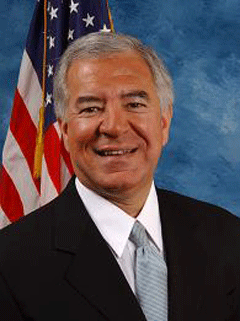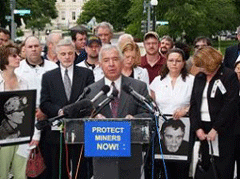Nick-ing Big Oil’s Bucks
Air Date: Week of January 12, 2007

Congressman Nick Rahall (Courtesy of U.S. House of Representatives)
Democratic leaders in Congress pledge to repeal subsidies to the oil industry. Living on Earth's Jeff Young talks with the new chair of the House Natural Resources Committee, Nick Rahall of West Virginia, who thinks the money now going to the oil industry should instead go toward turning coal into transportation fuel.
Transcript
GELLERMAN: The Democrats who just took control of Congress are promising a new direction on energy and the environment. One of the key players who will set the new course is Representative Nick Rahall of West Virginia. Rahall heads up the House Committee on Natural Resources. Among other things, the committee oversees federal programs on endangered species, national parks, and public lands. But the issue likely to get the most attention from the committee is the extraction of oil, gas, and minerals from federally-owned property. It puts Congressman Nick Rahall’s newfound power up against the powerful forces in the U.S. energy industry.
Living on Earth’s Jeff Young reports.
YOUNG: For more than three decades Nick Rahall has represented the third district of West Virginia--the rural, economically struggling counties that form the heart of Appalachia’s coal country. Now that he chairs the powerful House Committee on resources Rahall hopes to put coal to broader use. He wants money currently going to the oil industry to instead support technology that turns coal into a liquid transportation fuel, similar to diesel.
RAHALL: There’s a lot of coal in West Virginia there’s a lot of coal in eastern United States there’s a lot of coal in this country enough to supply us at a minimum for 250 years into the future and at a more economical price than what we’re paying for a barrel of oil. Yes, we should continue using coal to free this country from reliance upon foreign oil; yes, coal is a friend to our people.

Congressman Rahall speaking at a rally for mine safety legislation. (Courtesy of U.S. House of Representatives)
RAHALL: I do not advocate throwing the baby out with the bath water. Because the program itself has worked over the years and the basic framework is sound.
YOUNG: Rahall’s first act as chair was to add the word Natural to the committee’s name--a reminder, he says, of its broad responsibilities for stewardship. It oversees the Department of the Interior, which manages parks and public lands across the country and waters off the coast. Rahall says the committee under Republican control had largely abdicated its oversight role, and he hopes to restore that with hearings on how the Interior department manages royalties for oil and gas drilling on public land.
RAHALL: To strongly ask questions that perhaps have not been asked of this administration for the last six years, serious and tough questions: Why haven’t we collected for American taxpayer what is due the American taxpayer?"
YOUNG: Drilling royalties are the payments oil and gas companies make to use public land and waters. The Interior Department’s Minerals Management Service makes lease contracts with the companies. And it’s come under withering criticism in the past year for letting perhaps billions of dollars in royalties go uncollected. Back in the mid 90s, when the price of oil was low, a law called the Royalty Relief Act encouraged deep water exploration with a break from some royalties. Some lease contracts offered that break only when prices were low. Rahall says there was mismanagement of the royalty collections when oil prices soared.
RAHALL: There’s no question, and I think it’s agreed in a bipartisan fashion, that the present oil and gas royalty collection system is broke. And it needs repair. There are members of both sides of the aisle that agree that there are billions of dollars that have not been collected.
YOUNG: Officials at the Interior Department declined to comment. The department recently raised royalty rates slightly, and officials have tried to persuade oil companies to renegotiate leases for drilling rights in the Gulf of Mexico. Minerals Management chief Stephen Allred announced agreements with five companies last month.
ALLRED: These are the companies who have stepped up who have worked with us to find a solution to this, I hope it’s the first of many who will do this.
YOUNG: But more than fifty companies including some of the biggest in Gulf drilling—Exxon-Mobil and Chevron--said no thanks. John Felmy is chief economist for the American Petroleum Institute, the oil industry’s trade group in Washington. Felmy says a contract is a contract.
FELMY: To now go back and start revisiting these things is really a violation of fundamental contract principles of the United States. The royalty relief act is probably one of the most successful energy programs ever put in place. We’ve been able to find a vast amount of oil, we’ve been able to bring supplies to consumers. And we would hope that Congress understands that, and let’s not change what has been a success.
YOUNG: The incentives of the royalty relief act went into effect when oil was around 15 dollars a barrel. Now it fetches more than fifty—and that means royalty relief will get little sympathy in the hearings before Rahall’s committee.
RAHALL: I think with prices what they are today, with record profits being made by the oil companies today--more profits of any company in the history of our country—I hardly think now is the time that they need more incentives, and more grants, and more royalty holidays to go out there and drill.
YOUNG: Democratic leaders are going after oil subsidies in their first hundred hours of legislative action. Thursday, the House will debate a bill penalizing companies that refuse to renegotiate drilling contracts. And the bill would redirect oil subsidies to alternative fuels. For Living on Earth I’m Jeff Young in Washington.
Links
House Committee on Natural Resources
Living on Earth wants to hear from you!
Living on Earth
62 Calef Highway, Suite 212
Lee, NH 03861
Telephone: 617-287-4121
E-mail: comments@loe.org
Newsletter [Click here]
Donate to Living on Earth!
Living on Earth is an independent media program and relies entirely on contributions from listeners and institutions supporting public service. Please donate now to preserve an independent environmental voice.
NewsletterLiving on Earth offers a weekly delivery of the show's rundown to your mailbox. Sign up for our newsletter today!
 Sailors For The Sea: Be the change you want to sea.
Sailors For The Sea: Be the change you want to sea.
 The Grantham Foundation for the Protection of the Environment: Committed to protecting and improving the health of the global environment.
The Grantham Foundation for the Protection of the Environment: Committed to protecting and improving the health of the global environment.
 Contribute to Living on Earth and receive, as our gift to you, an archival print of one of Mark Seth Lender's extraordinary wildlife photographs. Follow the link to see Mark's current collection of photographs.
Contribute to Living on Earth and receive, as our gift to you, an archival print of one of Mark Seth Lender's extraordinary wildlife photographs. Follow the link to see Mark's current collection of photographs.
 Buy a signed copy of Mark Seth Lender's book Smeagull the Seagull & support Living on Earth
Buy a signed copy of Mark Seth Lender's book Smeagull the Seagull & support Living on Earth

